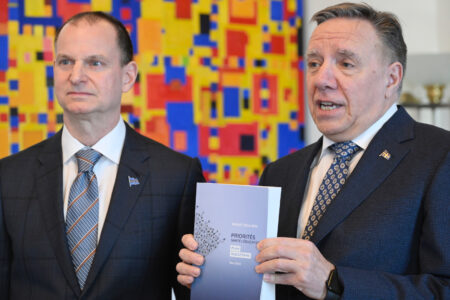
(Version française disponible ici)
Since 1980, unmarried cohabitation, or de facto union as it is known is Quebec, has emerged as the province’s dominant form of conjugal life. Yet during this time, the National Assembly has never addressed the relations between de facto spouses, whose relationships entail neither rights nor obligations under family law.
This long inaction ended with the justice minister’s tabling of Bill 56 in March respecting family law reform and establishing the parental union regime. However, this long-awaited reform gives cause for hesitation and even worry.
The centrepiece of the reform is the recognition of a legal status for de facto spouses who become parents of the same child after June 29, 2025. Parental union will attach to these couples’ primary residence the protections of the family residence under matrimonial law. It will trigger the creation of a “parental union patrimony,” or set of assets the increase of which is shared on union’s end, irrespective of which spouse is owner. Bill 56 proposes a light version of married spouses’ family patrimony. Moreover, the reform will allow a spouse by parental union to claim a compensatory allowance from the other on relationship breakdown.
It is worth acknowledging upfront that the bill proposes good measures relating to access to justice. For instance, it will authorize courts to better redress abuses of procedure in family law by taking into account family violence. Nonetheless, it is necessary to consider the reform’s problematic effects for children, for future spouses in parental union, and those de facto spouses who will stay outside the new regime.
Several categories of children
The justice minister says he wants to create “a safety net for the children whose parents are in a de facto union. […] When separation occurs, the children must be protected.” It is a worthy objective. But the proposal misses its target in numerous cases.
To be sure, the expanded application of the family residence regime, which allows the court to grant a right to use the family residence to the spouse to whom it awards custody of a child, can guarantee a certain stability during a separation. Yet, because of the regime’s prospective character, it will bring no new protection to children already born or who will be born to parents in a de facto union before June 29, 2025. Moreover, limiting the policy to children common to de facto spouses excludes the many other children living in a blended family, without a formal bond to their legal parent’s spouse.
In any event, parental union will offer these still unborn children much thinner protections than those benefiting children born to married parents. On divorce, spousal support for the poorer partner can address her need or mitigate the financial effects of childrearing. In contrast, the parental union will not subject the spouses to any measure based on family solidarity, such as an obligation of support. Yet the stability and economic security of the poorer parent, including when separation occurs, are inseparable from those of the child.
In short, Quebec’s children, who are said to be at the heart of the government’s concerns, will find themselves in three categories. First, those born to married parents will keep their current protections. Next, those born or adopted into a de facto union from June 2025 will benefit from a reduced version of those matrimonial protections. Finally, those who were born into a de facto union before the reform took effect, or who live in a blended family, will remain neglected relative to the others.
This segregation seems to contradict the spirit, if not the letter, of the foundational declaration of article 522 of the Civil Code: “All children whose filiation is established have the same rights and obligations, regardless of their circumstances of birth.”
Uneven results for those parents affected
As for those parents subject to the new status, we have seen that a union without any measures based on solidarity is lacking in substance.
What’s more, it is worth examining the proposal to codify the right of a spouse by parental union to seek a “compensatory allowance” from the other. Already available for married spouses, a compensatory allowance is a payment ordered by a court to recognize enduring contributions to one spouse’s property at the other’s expense. This recourse requires the claimant to prove her contribution to enriching the other as well as her correlative impoverishment. The burden of proof is heavy and the result uncertain.
Extending to unmarried parents the compensatory allowance – an add-on to the regimes for married spouses – will only increase the uncertainty. In effect, in the matrimonial context, courts have applied this mechanism using the opposition between any extraordinary contributions by the claimant and what the wealthier spouse received legitimately by virtue of marriage law, including the family patrimony, and any marriage contract (article 427 of the Civil Code). How will the case law developed in the complex matrimonial setting apply in the different context of the parental union?
More worrying still, the possibility of claiming a compensatory allowance may be less advantageous than the current law. At present, a de facto spouse, although excluded from matrimonial law, can bring a claim in unjust enrichment under the general private law.
Over decades, the Supreme Court of Canada and the Court of Appeal of Quebec have adapted the conditions for applying this recourse to take account of the distinctive context of de facto union. Among other things, the courts have recognized that a de facto union that can be characterized as a “joint family union” may justify sharing the value accumulated during the relationship. The result is that awards in unjust enrichment may be much bigger than ones for a compensatory allowance, despite the mechanisms’ similarities.
Although this recourse, adapted to de facto union, remains imperfect, it is an important tool. But, since unjust enrichment is a subsidiary recourse, it is precluded when the claimant could enforce another claim against the person enriched. Will the right to claim a compensatory allowance block access to the beefed-up claim in unjust enrichment, to the detriment of potential claimants?
Many couples ignored
In identifying the reform’s distinctions between children, we can see numerous couples for whom the reform does nothing. Think of de facto spouses whose children were born before June 29, 2025, as well as those who, in a blended family, are raising a child who is the legal child of only one of the partners.
However, a de facto union without children can also prompt investment in the endeavours of the couple and lead to an economic imbalance. Eldercare, often performed by women for the aging parents of their male partner, can be a major factor. Recall the famous lawsuit known as Éric v Lola. Five judges of the Supreme Court of Canada clearly recognized that excluding de facto unions from family law was discriminatory, albeit constitutional. That case, recognized as a catalyst for the proposed reform, concerned all de facto unions, without focusing on those constructed around a common child.
All told, the bill could be improved substantially. Its scope of application is narrower than necessary. In any event, couples’ freedom and autonomy are protected by the possibility, foreseen by the reform, of opting out of its key provisions. As for the praiseworthy aim of protecting children, the bill promises too little to too few of them.








